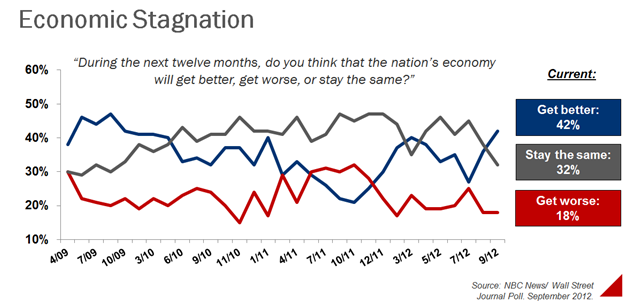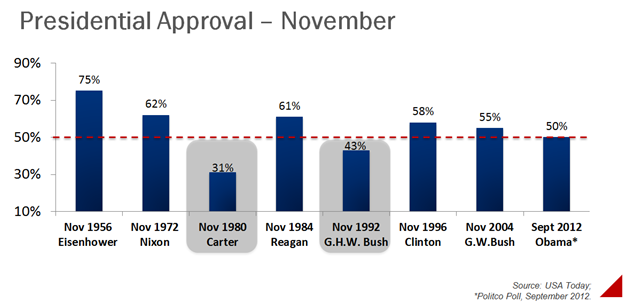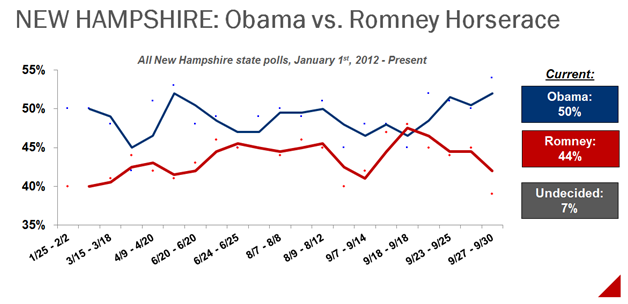
The Romney campaign appears to have righted itself in the last week, going on the offensive over Libya and working to reframe the race as a choice between two distinctly different governing philosophies. The president and his team are playing defense on Benghazi while continuing to assail the Governor's Massachusetts record. While the president still holds a lead in key battleground states, the national polling data is showing some tightening. With both the first presidential debate (tomorrow night in Denver) and the release of the latest unemployment numbers (Friday morning) we have entered the most important week of the presidential election. The next five days will go a long way toward determining the outcome on November 7th.
The following is our up-to-the-minute take on the current state of the election and some thoughts on key battleground states:
- It's still all about the economy. According to a recent CBS News/NYT poll, voters identified unemployment and jobs as this election's most important issue (43 percent). Second is the federal deficit at 14 percent. Yes, there is something to be said about people acclimating to the "new normal" of stagnation but they still want something done to improve the situation. Voters are starting to believe that the president is performing better on the economy because they think things are improving slightly, not because people are fatigued on the issue. A recent NBC/WSJ poll shows that the percentage of voters who believe that the economy will "get better" in the next 12 months improved from 28 percent in July to 42 percent in mid-September.

As the Wall Street Journal's Matthew Dalton said at a forum we both spoke at yesterday in Brussels: "The President is not doing better in spite of the economy, he is doing better because of the economy." Simply put, voters are slightly more optimistic. As we said a year ago, it's not the unemployment rate that's important, it's the trend to the unemployment rate. That is why the jobs data on Friday is so critical. If the economy added more than 100k jobs in August and the unemployment rate ticks down a bit, it will be a huge boost for the president.
- This election is unlikely to turn on Benghazi. To be sure, the Administration is vulnerable here, but unless voter salience increases it will have only a marginal impact on the race. According to the aforementioned CBS/NYT poll, only 6 percent of voters cite the "situation in the Middle East" as the most important issue facing the country today. Romney may be able to overtake President Obama in terms of their perceived ability to handle foreign affairs, but unless it is matched with a similar result on handling the economy it will have little impact on the election.
- Europe, however, is a problem for Obama. Yesterday, we learned that unemployment in the 17-member euro zone rose to 11.4 percent, the highest level since the introduction of the euro in 1999. Team Obama has been hoping to avoid a full blown eurozone crisis... at least until after the election. While the debt crisis is probably on hold, a further weakening of the European economy may have an effect on U.S. markets.
- The president's job approval numbers are now in the re-elect zone. The latest Gallup poll has President Obama's approval rating at 50 percent. While this is slightly behind President G. W. Bush's September 2004 numbers, it is well ahead of where he was six months ago (42 percent). As you can see from the below chart, the two presidents to lose reelection -- President Carter and President G.H.W. Bush -- had an approval rating well below 50 percent in November. If the president's approval rating stays at or near 50 percent, he has a strong likelihood of winning reelection.

- Romney's unfavorable rating is an albatross around his neck. Perhaps more than anything else, the debates have to improve Governor Romney's likeability. Yes, he has to contrast his vision of the future from the president's, but he desperately needs to convince swing voters that he cares about people like them. Romney's unfavorable rating exceeds his favorability score by four points; quite simply, he is unelectable with an underwater favorability rating. The debates have to change that or he will lose in November.
- Expect a Romney debate bounce. Others have made this point, but simply standing on the same stage as the president will help Romney's cause. And a recent ABC poll showed that most Americans expect the President to "win" the Wednesday debate; even if Romney fights to a draw, he'll be seen as exceeding expectations. While that won't be enough to win the election, it will help his poll numbers over the next week.
One thing that has caught our attention is the state of the generic congressional ballot. Historically, this has been a pretty good predictor of the composition of the electorate on election-day (if not the outcome itself). According to a Real Clear Politics analysis of past elections, their final average of all generic congressional ballot snapshots came awfully close to the actual vote. As a reminder, Republicans had a seven-point advantage in 2010 (52-R, 45-D), while Democrats enjoyed a 10-point advantage (43-R, 53-D) in 2008. This year RCP has the generic congressional ballot about even. In 2004, when Bush was reelected, Republicans had a two-point GCB advantage (49-47). For Republicans, being even with Democrats on the generic ballot is a positive development. This, combined with the enthusiasm gap that the GOP still enjoys, does offer some hope for those looking for a Romney turnaround.
Our assessment of the Electoral College remains basically unchanged with Obama at 247 lean or strong electoral votes and Romney with 191. Our sense is that eight states are in play: NV, CO, IA, OH, NH, VA, NC and FL. While Ohio and Florida have far larger EV contributions, New Hampshire has to be most troubling for Team Romney. The Governor has a summer house there and is well known to Granite State voters. Yet he has only led Obama in two of the 17 polls conducted there since January. A recent WMUR/University of NH poll had the President ahead by 15 points. While clearly an outlier, it suggests that the state is quickly moving away from Governor Romney.

Thanks again to Pete Ventimiglia, Kelsey Cohen and Allison Quigley for their insights and contributions to the election monitor. Follow us on Twitter: @Steve_Lombardo.
Please note that the author was an advisor to the Romney for President campaign in 2008, but is not affiliated with any campaign in 2012.